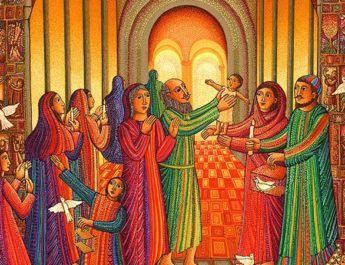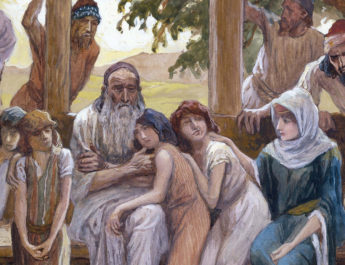Psalm 94
1 O Lord,I you GodII of vengeance,III
you God of vengeance, shine forth!IV
2 Rise up,V O judgeVI of the earth;VII
I “Lord” = YHVH. From havah (to be, become) or hayah (to come to pass, become, be). This is the name of the God of Israel, the self-existent and eternal one, the tetragrammaton. This pronunciation has been lost to time so “Lord” is generally used in its place.
II “God” = El.
III “vengeance” = neqamah. From naqam (a quarrel or vengeance); from naqam (to avenge, punish, have a grudge, execute). This is vengeance, or revenge – whether the act of vengeance or the drive towards vengeance.
IV “shine forth” = yapha. 8x in OT. This is to shine out beams, look favorably.
V “rise up” = nasa. This is to lift in a broad sense, literally and figuratively. So it could be to carry, take, or arise. It could also be bring forth, advance, accept.
VI “judge” = shaphat. This is to judge, defend, pronounce judgment, condemn, or govern. It can refer to God judging or to human judges. This is pronouncing a verdict in favor or against so it implies consequences or punishment. It can also mean to litigate or govern as one with authority.
VII “earth” = erets. Root may mean to be firm. This is earth, ground, field land, or country.
giveVIII to the proudIX what they deserve!X
3 O Lord, how long shall the wicked,XI
how long shall the wicked exult?XII
VIII “give” = shub. To turn back, return, turn away – literally or figuratively. Doesn’t necessarily imply going back to where you started from. This is also the root verb for the Hebrew word for repentance “teshubah.”
IX “proud” = geeh. 8x in OT. From gaah (to rise up, lift, triumph, be majestic or exalted). This is proud, lofty, or arrogant.
X “what they deserve” = gemul. 19x in OT. From gamal (how one deals with someone whether positively or negatively – so to reward, requite; to wean or the work that goes into something ripening). This is benefit, deed, recompense. It is some treatment that is deserved or earned, whether positive or negative. It can be reward or requital.
XI “wicked” = rasha. This is to be wicked, guilty, make trouble, do wrong. It can also be condemn, guilty, inflict punishment. This verb implies disturbing or violating.
XII “exult” = alaz. 16x in OT. This is to jump for joy, rejoice, triumph, or be jubilant.
4 They pour outXIII their arrogantXIV words;XV
allXVI the evildoersXVII boast.XVIII
XIII “pour out” = naba. 11x in OT. This is to spring up, flow, gush, or spout. It can also mean to belch as in emitting a bad smell. Figuratively, it can mean to speak, whether positively or negatively.
XIV “arrogant” = athaq. 4x in OT. From atheq (to move, advance, remove or continue; figuratively, to grow old or to copy or transcribe). This is arrogant, insolent, arrogance, impudent, stiff.
XV “words” = dabar. This is generally to speak, answer, declare, or command. It might mean to arrange and so to speak in a figurative sense as arranging words.
XVI “all” = kol. From kalal (to complete). This is all or every.
XVII “evildoers” = paal + aven. Paal is to do, make, work, or accomplish. Generally refers to regularly repeated or systematic action – so, to practice. Aven has a root that may mean panting as one does when expending a lot of energy, especially when it comes to nothing. This is nothingness, trouble, sorrow, distress, wickedness, evil, harm, sorrow, misfortune, and mischief. It is also used specifically to refer to idols.
XVIII “boast” = amar. This is to say or speak. Here, it is in hithpael, which is the reflexive form.
5 They crushXIX your people,XX O Lord,
and afflictXXI your heritage.XXII
XIX “crush” = daka. 18x in OT. This is to crush or break into pieces. It can also mean bruise, being contrite or oppressed, to destroy, or be humble.
XX “people” = am. From amam (to darken, hide, associate; creating shadows by huddling together). This is people or nation. It can be used specifically for a tribe, collectively of troops or armies, or figuratively to refer to a flock of animals.
XXI “afflict” = anah. This is to be bowed down. It can refer to a sense of humility or to a sense of being browbeaten, oppressed, afflicted, or depressed. This can be literal or figurative – depressed in mood or circumstance.
XXII “heritage” = nachalah. Related to nachal (to inherit, occupy, distribute, take as heritage). This is properly something that was inherited. It can mean occupancy generally or, more particularly, an heirloom or an estate. This can be an inheritance, gift, possession, or portion.
6 They killXXIII the widowXXIV and the stranger,XXV
they murderXXVI the orphan,XXVII
XXIII “kill” = harag. This is to strike with deadly intent so it can be kill, destroy, murder, or put to death.
XXIV “widow” = almanah. Related to alman (widowed); from alam (to be silent, bound). This is a widow or a house that is desolate.
XXV “stranger” = ger. From gur (to abide or sojourn; to leave the road to lodge or for any other reason). This is sojourner, guest, stranger, foreigner.
XXVI “murder” = ratsach. Properly, this is to dash something to pieces. It is to kill a person, but it is used particularly (though not exclusively) for murder.
XXVII “orphan” = yathom. This is a child without a father or more generally a person who is bereaved.
7 and they say, “The LordXXVIII does not see;XXIX
the GodXXX of JacobXXXI does not perceive.”XXXII
XXVIII “Lord” = Yah. Related to “Lord” in v1. From YHVH (see note I above). This is Lord or God – a shortened form of God’s most holy name.
XXIX “see” = raah. This is to see in a literal or figurative sense so stare, advise, think, view.
XXX “God” = Elohim. Related to “God” in v1. See note II above.
XXXI “Jacob” = Yaaqob. From the same as aqeb (heel, hind part, hoof, rear guard of an army, one who lies in wait, usurper). This is Isaac’s son and his descendants. The name means heel-catcher or supplanter.
XXXII “perceive” = bin. This is to discern, consider, attend to. It refers to distinguishing things in one’s mind or, more generally, to understand.
8 Understand,XXXIII O dullestXXXIV of the people;
fools,XXXV when will you be wise?XXXVI
XXXIII “understand” = bin. Same as “perceive” in v7. See note XXXII above.
XXXIV “dullest” = ba’ar. This is to burn, consume, heat, remove. It can also be to consume by a fire or through eating, being brutish or wasting.
XXXV “fools” = kesil. From kasal (being or becoming stupid or foolish; properly, being fat and so figuratively silly or foolish). This is someone who is stupid, silly, or foolish.
XXXVI “be wise” = sakal. This is to consider or be prudent and so it can mean to instruct or be an expert. It can also mean dealing prudently, which implies success and prospering. This verb presumes intelligence of the subject. In one form of the verb, it can mean laying cross-wise.
9 He who plantedXXXVII the ear,XXXVIII does he not hear?XXXIX
He who formedXL the eye,XLI does he not see?XLII
XXXVII “planted” = nata. To fix or fasten, establish or plant. This is planting in a literal or figurative sense.
XXXVIII “ear” = ozen. This is ear, hearing, audience, show. Properly, it is broadness – applied to its ear in reference to its shape.
XXXIX “hear” = shama. This is to hear, call, consent, or consider. It implies listening intelligently, giving attention, and, because of these two factors, obedience and action are often implied.
XL “formed” = yatsar. Perhaps related to yatsar (to be narrow, distressed, or vexed); perhaps related to tsarar (to bind, restrict, narrow, be cramped, an adversary). This is to fashion or form, perhaps by squeezing something into a shape or form. Particularly, it is to create as a potter does. Figuratively, it is to determine.
XLI “eye” = ayin. This is eye in a literal or figurative sense so eye, appearance, favor, or a fountain (the eye of the landscape).
XLII “see” = nabat. This is to behold, look at intently, consider, or scan. It can mean to have respect or regard someone favorably.
10 He who disciplinesXLIII the nations,XLIV
he who teachesXLV knowledgeXLVI to humankind,XLVII
does he not chastise?XLVIII
XLIII “disciplines” = yasar. This is to discipline, correct, train, teach, punish. Literally, itt is disciplining with blows, but figuratively using words.
XLIV “nations” = goy. Related to “proud” in v2. From the same root as gevah (the back, person, or body); related to gev (among); related to gaah (see note IX above). This is nation or people. Often used to refer to Gentiles or foreign nations. It can also be used figuratively for a group of animals. This is where the Yiddish “goy” comes from.
XLV “teaches” = lamad. Properly, this refers to goading (using a pointed stick to guide or prod one’s flock). By implication, it means teaching or instructing.
XLVI “knowledge” = daat. From yada (to know, be aware, see and so understand – includes observation, care, recognition; can also be used as a euphemism). This is knowledge, unawares, cunning, wittingly.
XLVII “humankind” = adam. Perhaps from adam (to be red, make ruddy); related to adamah (ground, dirt, earth). This is man, humankind, also Adam’s name. It refers to a human individual or humanity.
XLVIII “chastise” = yakach. This is to decide, be right, argue, or convince. It can also be to decide, convict, reason together, or reprove.
11 The LordXLIX knowsL ourLI thoughts,LII
that they are but an empty breath.LIII
XLIX “Lord” = YHVH. Same as “Lord” in v1. See note I above.
L “knows” = yada. Related to “knowledge” in v10. See note XLVI above.
LI “our” = adam. Same as “humankind” in v10. See note XLVII above.
LII “thoughts” = machashabah. From chashab (literally to weave; figuratively to think or plot something malicious). This is thought, scheme, imagination, purpose, or a plan either good or evil.
LIII “empty breath” = hebel. This is emptiness, vapor, breath. It can refer to something that is fleeting or futile, worthless or a delusion. Something that is passing and so does not satisfy. This is related to the root for the name “Abel.”
12 HappyLIV are thoseLV whom you discipline, O Lord,LVI
and whom you teach out of your law,LVII
LIV “happy” = esher. From ashar (to go straight, lead, guide; to be level and so to be right, blessed, honest, happy). This is happy or blessedness.
LV “those” = geber. From gabar (to be strong or mighty; to prevail or to be insolent) This is man, warrior, a person generally, or a valiant person.
LVI “Lord” = Yah. Same as “Lord” in v7. See note XXVIII above.
LVII “law” = torah. From yarah (to throw, shoot, be stunned; to flow as water so figuratively to instruct or teach). This is law, instruction, teaching, or statute. It can also refer to the first five books of the Bible – the Torah.
13 giving them respiteLVIII from daysLIX of trouble,LX
LVIII “giving…respite” = shaqat. This is to be quiet, rest, calm, settle, be still, peace.
LIX “days” = yom. Root may mean being hot. This is the day in a literal or figurative sense. It can also mean birth, age, daylight, continually or other references to time.
LX “trouble” = ra’. From ra’a’ (to be evil, bad, afflict; properly, to spoil – to destroy by breaking into pieces; figuratively, to cause something to be worthless; this is bad in a physical, social, or moral sense; that which displeases, to do harm or mischief, to punish or vex). This is bad, disagreeable, that which causes pain, misery, something having little or no value, something that is ethically bad, wicked, injury, calamity. This refers to anything that is not what it ought to be – a natural disaster, a disfigurement, an injury, a sin.
until a pitLXI is dugLXII for the wicked.
14 For the LordLXIII will not forsakeLXIV his people;
he will not abandonLXV his heritage;
LXI “pit” = shachat. From shuach (to bow or sink down in a literal or figurative sense, humble). This is ditch, trap, grave, or hole. Figuratively, it could be destruction or corruption.
LXII “dug” = karah.17x in OT – 8x of digging a pit or trap, 2x of digging a well, 2x of digging a tomb, 2x of bargaining, 1x shriveled, 1x opening an ear, and 1x of digging up evil. This is properly to dig or open up. Figuratively, it can be to plot or make a banquet.
LXIII “Lord” = YHVH. Same as “Lord” in v1. See note I above.
LXIV “forsake” = natash. Properly, this is to beat or pound as when something is beaten in order to expand or disperse. It can be leave, abandon, allow, neglect, spread, fall, or thrust out.
LXV “abandon” = azab. To loosen, relinquish, permit, forsake, fail, leave destitute.
15 for justiceLXVI will returnLXVII to the righteous,LXVIII
LXVI “justice” = mishpat. Related to “judge” in v2. From shaphat (see note VI above). This is a verdict or formal sentence whether from humans or from God. It includes the act of judging as well as the place that judging takes place, the suit itself, and the penalty. Abstractly, this is justice, which includes the rights of the participants.
LXVII “return” = shub. Same as “give” in v2. See note VIII above.
LXVIII “righteous” = tsedeq. This is rightness, righteousness, vindication. It is everything that is just or ethical. That which is right in a natural, moral, or legal sense. It also includes just weights (i.e. true weights). Figuratively, this is justice, righteousness, equity – even prosperity.
and all the uprightLXIX in heartLXX will followLXXI it.
16 Who rises upLXXII for me against the wicked?LXXIII
Who stands upLXXIV for me against evildoers?
LXIX “upright” = yashar. From yashar (to be straight, right, even, smooth, or agreeable; figuratively, to make something pleasant or prosperous). This is straight, right, level. Also, it is pleasing, whether pleasing God or pleasing other people. So, it is upright or righteous.
LXX “heart” = leb. May be related to labab (to encourage; properly, to be encased as with fat; used in a good sense, this means to transport someone with love; used in a bad sense, it can mean to dull one’s senses). This is the heart, courage, one’s inner self, the mind, or the will. Heart is only used in a figurative sense in the Old and New Testaments.
LXXI “follow” = achar. Form achar (to remain behind, linger, continue, be behind, or delay; can also imply procrastination). This is after or the last part, following.
LXXII “rises up” = qum. To arise, stand, accomplish, establish, abide. This is rising as in rising against, getting up after being sick or asleep, arising from one state to another, becoming powerful, or rising for action. It can also be standing in a figurative sense.
LXXIII “wicked” = ra’a’. Related to “trouble” in v13. See note LX above.
LXXIV “stands up” = yatsab. This is to set oneself, take a stand, remain, continue, to station or set something in place.
17 If the LordLXXV had not been my help,LXXVI
my soulLXXVII would soonLXXVIII have livedLXXIX in the land of silence.LXXX
LXXV “Lord” = YHVH. Same as “Lord” in v1. See note I above.
LXXVI “help” = ezrah. From ezer (help, aid, helper); from azar (to help, protect, support, ally; properly, to surround so as to provide aid). This is help, helper, support.
LXXVII “soul” = nephesh. Related to naphash (to refresh or be refreshed). This is soul, self, person, emotion. It is a breathing creature. Can also refer to appetites and desires.
LXXVIII “soon” = me’at. From ma’at (being or becoming small, decrease, diminish, pare off). This is a little or few, lightly little while, very small matter.
LXXIX “lived” = shakan. This is to settle down in the sense of residing somewhere or staying there permanently. It can mean abide or continue. “Mishkan,” taken from this verb, is the Hebrew word for the Tabernacle (as a place where God abided).
LXXX “silence” = dumah. 2x in OT – both in Psalms. This is silence. Figuratively, it can mean death.
18 When I thought,LXXXI “My footLXXXII is slipping,”LXXXIII
your steadfast love,LXXXIV O Lord,LXXXV held me up.LXXXVI
LXXXI “thought” = amar. Same as “boast” in v4. See note XVIII above.
LXXXII “foot” = regel. This is foot, endurance, or journey. It is a foot as the means of walking and so it implies a step or a greater journey. It can be used euphemistically for private parts.
LXXXIII “slipping” = mot. This is to shake, slip, falter, stagger, move, fall, give way, waver, be carried.
LXXXIV “steadfast love” = chesed. From chasad (being good, kind, merciful; may mean bowing one’s neck as is done in the presence of an equal for courtesy’s sake; so, if one in a superior position is treating you like an equal, that is what is captured here). This is favor, goodness, kindness, loving kindness, pity, reproach, or a good deed. When done by God to humanity, this is mercy/loving kindness. When done by humanity to God, it is piety.
LXXXV “Lord” = YHVH. Same as “Lord” in v1. See note I above.
LXXXVI “held…up” = saad. 12x in OT. This is to support – usually used in a figurative sense. So it is sustain, hold, refresh, comfort, establish.
19 When the caresLXXXVII of my heartLXXXVIII are many,LXXXIX
your consolationsXC cheerXCI my soul.
LXXXVII “cares” = sarappim. 2x in OT. From the same as seippim (uneasy or enthusiastic thoughts) OR from saiph (opinion, sentiment); {see seippah (division; conflicted opinion); from the same as saiph (fissure, branch, cleft); from saaph (to divide, cut off branches from a tree, top off); from seappah (branch, twig)}. This is disquieting or anxious thoughts.
LXXXVIII “heart” = qereb. Perhaps from qarab (to come near or approach). This is among, in the midst, before, the center It is the inward part, whether literal or figurative. It can also be used for the heart, the site of thoughts and feelings. This word is also used as a technical term for the entrails of the animals who are sacrificed.
LXXXIX “many” = rob. From rabab (to be or become much or many, multiply). This is any kind of abundance.
XC “consolations” = tanchum. 5x in OT. From nacham (a strong breath or sigh; to be sorry, to pity, console, comfort, or repent; also to comfort oneself with thoughts of vengeance). This is consolation, comfort, or solace.
XCI “cheer” = sha’a. 9x in OT– all in the Psalms and Isaiah. This is to play, delight, stare, cry out, cheer. It can also be to shut eyes, to be blind.
20 Can wickedXCII rulersXCIII be alliedXCIV with you,
XCII “wicked” = havvah. Related to “Lord” in v1 & “Lord” in v7. 15x in OT. From havah (see note I above). This is a chasm, emptiness, or deep pit. It can be destruction or calamity. It can also be greed, craving, or mischief. It implies falling and ruin.
XCIII “rulers” = kisse. From the same as kese (full moon); perhaps from kasah (to cover, conceal, overwhelm; to cover as clothes do or to hide a secret). This is throne – a seat that is covered or has a canopy. Thus, it is a seat that conveys authority.
XCIV “be allied” = chabar. This is to unite, ally, attach, touch. It is to join in a literal or figurative sense. Also, specially, using magic knots or spells to fascinate or connect.
those who contriveXCV mischiefXCVI by statute?XCVII
XCV “contrive” = yatsar. Same as “formed” in v9. See note XL above.
XCVI “mischief” = amal. From amal (to work – hard labor). This is trouble, toil, labor as well as misery, sorrow, or iniquity. It is work that wearies through effort so hence worry – can refer to body or mind.
XCVII “statute” = choq. From chaqaq (to inscribe, carve, or decree; a lawmaker; literally, this is engraving, but it implies enacting a law because laws were carved into stone or metal). This is statute, boundary, condition, custom, limit, ordinance It is something that is prescribed or something that is owed.
21 They band togetherXCVIII against the lifeXCIX of the righteous,C
and condemn the innocent to death.CI
XCVIII “band together” = gadad. 8x in OT. This is to cut, gather, assemble, crowd. Also, it is to gash as pushing in.
XCIX “life” = nephesh. Same as “soul” in v17. See note LXXVII above.
C “righteous” = tsaddiq. Related to “righteous” in v5. From the same as tsedeq (see note LXVIII above). This is just, innocent, righteous, righteous one, or lawful.
CI Literally, “condemn the blood of the innocent” = dam + naqiy + rasha. Dam is perhaps from damam (to cease, be or become mute, silent, still, cut off, hold peace, be astonished, die). This is blood, bloodshed, bloodguilt, lifeblood, and death. It is used for people and animals. More often blood from a wound or the blood of the innocent. Used figuratively for violence or for wine. Closely tied to life and death. Naqiy is from naqah (to be empty, cleanse, acquit; to be clean in a literal or figurative sense). This is blameless, innocent, free from punishment, or clear. Rasha is to be wicked, guilty, make trouble, do wrong. It can also be condemn, guilty, inflict punishment. This verb implies disturbing or violating.
22 But the LordCII has becomeCIII my stronghold,CIV
and my GodCV the rockCVI of my refuge.CVII
CII “Lord” = YHVH. Same as “Lord” in v1. See note I above.
CIII “become” = hayah. Related to “Lord” in v1 & “Lord” in v7. See note I above.
CIV “stronghold” = misgab. 17x in OT. From sagab (raise, lifted, high, secure on high, excellent, strong; literal and figurative). This is a high or inaccessible location. Abstractly, it can be altitude. Concretely it is a cliff or height. Figuratively, it is a refuge or stronghold – a high fort or tower. There is also a place called Misgab in Moab.
CV “God” = Elohim. Same as “God” in v7. See note XXX above.
CVI “rock” = tsur. From tsur (to confine, cramp, or bind in a literal or figurative sense; to besiege, assault, or distress). This is rock, stone, cliff, boulder, rocky. It can also be a refuge, a way to refer to God.
CVII “refuge” = machaseh. From chasah (to take refuge or flee for protection; figuratively, to hope or trust in someone or something). This is a shelter in a literal or figurative sense. It is refuge or place of refuge. It could also be hope or trust.
23 He will repayCVIII them for their iniquityCIX
and wipe them outCX for their wickedness;CXI
the LordCXII our GodCXIII will wipe them out.
CVIII “repay” = shub. Same as “give” in v2. See note VIII above.
CIX “iniquity” = aven. Same as “evildoers” in v4. See note XVII above.
CX “wipe…out” = tsamat. 15x in OT. This is to destroy, cut off, silence, or vanish. It is to put an end to in a literal or figurative sense.
CXI “wickedness” = ra’. Same as “trouble” in v13. See note LX above.
CXII “Lord” = YHVH. Same as “Lord” in v1. See note I above.
CXIII “God” = Elohim. Same as “God” in v7. See note XXX above.
Image credit: “Unequal Justice in America” by DonkeyHotey, 2013.




